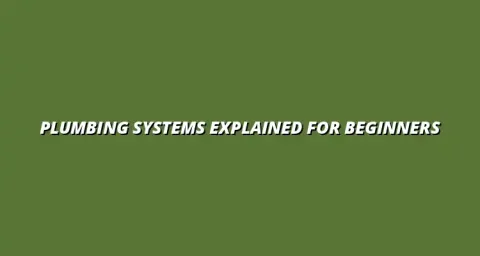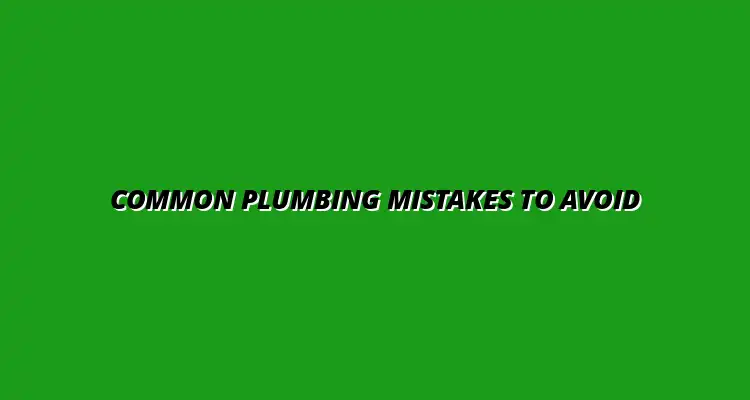
- Plumbing Basics
- Dec 24
2025-01-10
Plumbing can be a tricky business, especially for beginners. Many newcomers dive into plumbing projects without fully understanding the potential pitfalls they may encounter. By grasping common plumbing errors, you can save time, money, and a lot of stress!
Learning about these mistakes is essential. It not only helps in avoiding costly repairs but also boosts your confidence as a DIY plumber. Knowledge is power, and in plumbing, it can make the difference between a successful project and a frustrating mess. For example, learning how to fix a leaky faucet can be a great first step for beginners.
When tackling plumbing tasks, having a basic understanding is crucial. This knowledge lays the groundwork for effective problem-solving while also ensuring that your home remains safe from potential plumbing disasters. Even simple tasks can lead to big issues if not executed correctly!
For beginners, education is vital. It empowers you to make informed decisions and reduces the risks of making errors. This foundational knowledge can also help in communicating effectively with professionals when needed. It's also important to understand home plumbing safety tips to prevent accidents.
Newbie plumbers should invest time in learning plumbing basics. Understanding the terminology and tools used can significantly ease the process. Here are some reasons why education is important:
By taking the time to educate yourself, you set a solid foundation for your plumbing journey. Knowledge is not just power; it’s a ticket to successful plumbing!
Ignoring basic plumbing principles can lead to a variety of issues. Simple mistakes can escalate into major problems, often requiring professional intervention. Here are some common consequences of neglecting plumbing education:
Understanding these consequences can motivate you to learn the fundamentals of plumbing. The time spent on education will undoubtedly pay off in the long run! For example, neglecting winter plumbing preparation can lead to costly repairs. Learn more about winter plumbing preparation.
As new plumbers venture into their projects, they often encounter various challenges. It's essential to recognize these hurdles to navigate them successfully. Many beginners experience setbacks that could have been avoided with a little more preparation.
Some common plumbing challenges include improper tool use, overlooking safety measures, and failing to follow local plumbing codes. Recognizing these issues early can help you avoid major pitfalls! If you're tackling a kitchen plumbing issue, knowing how to fix a clogged kitchen sink is a valuable skill.
Beginners often find themselves in tricky situations that can lead to mistakes. Here are some typical scenarios where errors frequently happen:
Being aware of these situations can prepare you for the challenges ahead. With the right preparation, you can transform your plumbing experience into a successful adventure! Dealing with water heater issues? This guide can help.
Every DIY plumber has limitations, and recognizing them is essential for success. It’s okay to know when a project is beyond your skill set. Here are some signs that you might need to call in a professional:
Understanding your limitations allows you to focus on what you can handle. It also ensures that you seek help when necessary, ultimately saving you time and frustration! For example, if you need a plumber in Tyseley, Birmingham, you can find one here.
Encountering a plumbing problem can be stressful, but taking a few steps can help you manage the situation effectively. First, assess the problem to determine its severity. If it's a minor issue, like a slow leak, you might be able to fix it yourself. However, if there’s significant water damage or flooding, it’s crucial to act quickly!
One of the first actions you should take during a plumbing emergency is to turn off the water supply to prevent further damage. If you’re unsure where that is, check under sinks or near your water heater. After that, you can begin to figure out what needs to be done next. A common issue is a running toilet. Learn how to fix a running toilet easily.
Knowing when to engage a professional can save you time and money. If the problem is beyond your skill level or requires specialized tools, it might be best to call in an expert. Signs that you should reach out to a plumber include:
By recognizing these situations, you can prevent further complications and ensure your plumbing is handled correctly!
Understanding the costs related to plumbing errors can help in financial planning for repairs. The price of fixing a mistake can vary widely depending on the severity of the issue. For example, small leaks might cost as little as $100 to repair, while more complicated problems could run into the thousands.
Some common plumbing mistakes and their associated costs include:
Creating a budget for plumbing repairs can ease the financial burden when issues arise. Start by setting aside a specific amount each month for home maintenance. It’s wise to have an emergency fund dedicated to unforeseen plumbing costs.
Additionally, consider these budgeting tips:
By planning ahead, you can be better prepared for any plumbing challenges that come your way!
When it comes to plumbing projects, having the right tools is vital for success and efficiency. For beginners, investing in essential plumbing tools will make your tasks easier and help you avoid common mistakes. Some must-have tools include:
Finding trustworthy resources and guides can help enhance your plumbing knowledge. Look for reputable websites, instructional videos, and books that cover both basic and advanced topics in plumbing. Local hardware stores often offer free workshops as well!
Here are some great places to seek out plumbing resources:
These resources can help you troubleshoot issues and improve your skills over time.
Gaining confidence in plumbing comes with practice and a willingness to learn. Start with small projects around your home, like fixing a leaky faucet or changing a showerhead, to build your skills. Each successful repair will boost your confidence and prepare you for bigger challenges!
Additionally, consider these strategies to enhance your learning experience:
Connecting with others who share your interest in plumbing can provide valuable support and guidance. Join community groups, forums, or social media pages where you can ask questions and share experiences. This camaraderie can help you feel more motivated and less isolated in your plumbing journey!
Consider participating in local DIY clubs or online groups for:
Engaging with these communities can enhance your skills and confidence significantly!
Every DIY plumber makes mistakes, and that’s perfectly okay! Each error is a chance to learn and improve your skills. Embrace these learning moments, as they are essential for growth in your plumbing journey.
By reflecting on past mistakes, you can gain valuable insights that will help you become a more proficient plumber. Remember, even professional plumbers learned from their errors!
Don't let fear of making mistakes hold you back. It's all part of the learning process! With time, practice, and the right resources, you’ll build the skills necessary to tackle more complex plumbing tasks.
Valuing experience over perfection will help you stay motivated and continuously improve. Keep a positive outlook, and you'll see progress in no time!
Now that you're equipped with knowledge about plumbing mistakes and improvements, it’s time to take action! Explore more resources to continue your education, whether it’s through books, videos, or hands-on practice.
Connecting with professionals can also provide guidance and mentorship, so don't hesitate to reach out. They can offer valuable insights that will help you avoid common pitfalls.
Here are some excellent resources to further develop your plumbing skills:
By utilizing these resources, you can build on your foundation and become a more confident DIY plumber!
